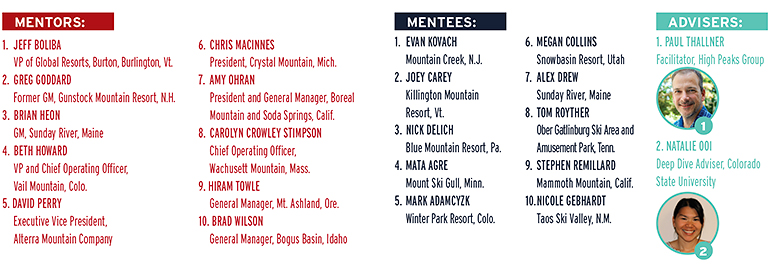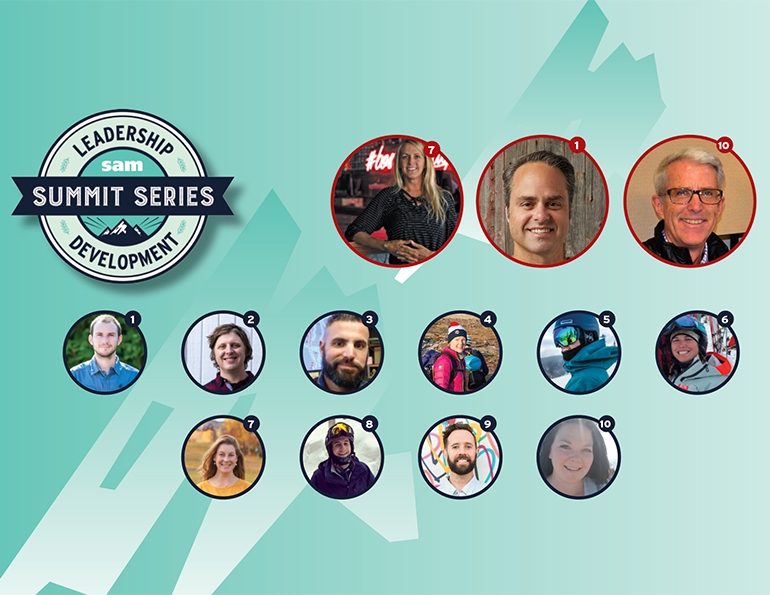

The third edition of the SAM Summit Series kicked off last fall with 10 current industry leaders mentoring 10 next-generation leaders. This continued the mentor–mentee dialogue SAM started three years ago to assist in the development of the mountain resort industry’s future leadership.
Mountain resorts are grappling with the challenge of adapting to the changing dynamics of the COVID-19 pandemic. One thing many are asking is not just “How do we survive?” but “How do we thrive?” The Summit Series session on industry sustainability offered several insights about the latter. This pre-COVID discussion highlighted that “sustainability,” even at the time of this session, involved so much more than just “going green.” And as we’ve found with all of these Summit Series sessions, many of the lessons apply in the context of the current challenges our industry is facing.
We offer excerpts of the conversation here with mentors Amy Ohran, president and general manager, Boreal and Soda Springs, Calif.; Jeff Boliba, vice president of global resorts, Burton; and Brad Wilson, general manager, Bogus Basin, Idaho.
What Is Industry Sustainability?
“Industry sustainability is finding a way to stay financially and culturally viable by addressing some of the key challenges of our time,” said Wilson, a prescient statement given our current situation. Financial and cultural viability are persistent challenges for an industry that relies on Mother Nature and a relatively small slice of the population for its success. The industry’s sustainability will be put to the ultimate test this winter.
Sustainability is often defined as maintaining at a certain level, and not necessarily associated with growth. For the ski industry, that won’t do. “We won’t be successful if we’re just trying to hold on,” said Ohran. “It’s an evolution conversation as much as it is a conversation about sustainability.” This is a critical distinction as resorts explore adaptations in the face of the pandemic and look toward longer-term changes that can ensure the viability of our winter (and summer) playgrounds for years to come.
“We need to take a holistic approach to protect the people, the playground, and the products,” said Boliba, adapting the concept of the three pillars of corporate sustainability—profits, planet, and people—to our industry.
Challenges and Opportunities
Sounding as though she knew what was coming, Ohran stressed the importance of being mindful of your mindset when the going gets tough. “Sometimes the challenge can seem so big and so unsolvable that we start to feel that there’s an inevitability to our industry,” she said. “It’s easy to get overwhelmed, and that creates a sense of apathy. Apathy is the biggest challenge we have ahead of us.”
For this winter, ski areas must assess each aspect of operations—from lift mazes to lessons to food and beverage—and make changes aimed at stemming the spread of the virus. However, as noted during several SAM Huddles (and in articles here in SAM), many operators are also seeing this as an opportunity to make long-needed changes that will streamline operations and improve the overall resort experience for years to come. Challenge and opportunity are two sides of the same coin.
Involve everyone. The odds of turning challenge into opportunity are best when the entire staff gets involved. The task shouldn’t fall entirely on the shoulders of upper management. As Wilson noted in response to a question about transitioning company culture, “It’s important to bring [the staff] into the fold and let them understand why we’re doing what we’re doing.” And then, it’s important to listen to their input and commentary on the plan.
Staff members at all levels and in all departments are going to be impacted by changes that are likely needed for this winter. Getting staff involved early on is critical—not only for planning purposes, but also to get universal buy-in and have everyone on the same page. This is especially important because staff will need to adapt as more changes occur, and feel comfortable providing feedback to management. Engaged front-line staff are more apt to proactively raise their hand about changes that are working—and those that aren’t.
Some changes could be permanent. Ohran noted that, as resorts look to these organizational shifts, it is important to lay out a longer-term plan and to be acutely aware of the many ways a business model shift may impact the operation. That’s a key aspect of capitalizing on any opportunity.
Strength in numbers. Of course, growing the number of paying guests is key to the financial sustainability of the industry. “One of the biggest challenges—and opportunities—is to further enhance the first-time learning experience,” said Boliba. That remains a key goal.
If summer trends are any indication, consumers are itching to get out of their homes and enjoy the outdoors. It’s possible that many new skiers and riders will flock to the mountains in an effort to get outside for some wintertime recreation. These guests likely have no idea what the “old normal” was, so their experience in the “new normal” must be factored in when planning for this winter if the industry wants them to become long-term evangelists of the sport.
Wishes for the Future
The mentors were asked to share a valuable piece of advice and a wish for the future for the mentees as they continue their careers in the industry.
“Be an opportunity manager,” said Boliba. “There are all kinds of challenges, and you can get bogged down worrying about things that are out of your control. Be an opportunity manager and focus on the things you can control.”
Ohran encouraged mentees to look for opportunities to innovate. The time for it is ripe. The mantra for many leaders nowadays is, “Never waste a good crisis,” and this crisis is loaded with opportunities for innovation and evolution that will help the industry thrive.
ABOUT THE SUMMIT SERIES
The SAM Summit Series has created a platform for current industry leaders to share knowledge with aspiring leaders for three successful years. We’ve shared these conversations here in the pages of SAM, online at saminfo.com, and on PodSAM.
Special thanks to the Summit Series sponsor, MountainGuard; to our program partner, High Peaks Group; and to Colorado State University and Dr. Natalie Ooi, our Deep Dive Partner.
WHAT’S NEXT
2020 has proven to be an exceptional year, full of challenges. It has required a lot from leaders both seasoned and aspiring. This fall, the Summit Series will pivot to a “resilient leadership” workshop that will focus on the extraordinary set of skills needed for the winter ahead.
Head to saminfo.com/leadership for more information or to reserve your spot. Space is limited. Direct questions to: olivia@saminfo.com.






